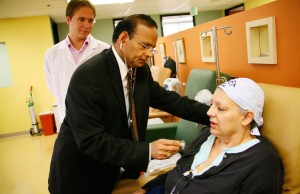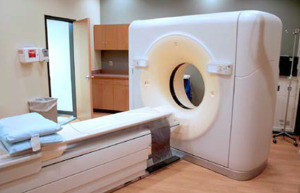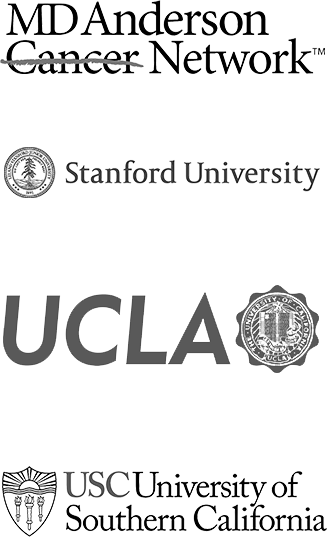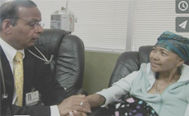Lung Cancer
 Lung cancer (also known as pulmonary carcinoma) is a type of cancer that develops in lung tissue when the cells of a malignant tumor grow uncontrollably. While a large number of cases can result from long-term and second-hand tobacco exposure, the disease is also caused by a number of other reasons including lifestyle choices, genetic issues, and environmental factors. Occasionally, these pulmonary carcinomas must be removed.
Lung cancer (also known as pulmonary carcinoma) is a type of cancer that develops in lung tissue when the cells of a malignant tumor grow uncontrollably. While a large number of cases can result from long-term and second-hand tobacco exposure, the disease is also caused by a number of other reasons including lifestyle choices, genetic issues, and environmental factors. Occasionally, these pulmonary carcinomas must be removed.
Metastatic tumors behave differently from primary lung cancer because they reach the lungs through the bloodstream, lymphatic system, or from nearby organs and scatter throughout the lungs and its outer areas but not in central internal areas.
Overview of Pulminary Carcinoma
There are three main types of lung cancer and each affects treatment options and prognosis:
- Non-Small Cell Lung Cancer – the most common type of lung cancer comprising approximately 85% of cases. Subtypes of this classification are squamous cell carcinoma, adenocarcinoma, and large cell carcinoma.
- Small Cell Lung Cancer – also called “oat cell” cancer. Approximately 10-15% of malignant growth cases are small cell and this type tends to spread quickly.
- Lung (Bronchial) Carcinoid Tumor – only 5% of lung cancers are this subtype. Sometimes called lung neuroendocrine tumors. The tumors are small, grow slowly and rarely spread. Unrelated to smoking.

The best strategy for early diagnosis is prompt attention to the early signs and symptoms of lung cancer and knowing family medical history. If something is suspected, then a specialist should be consulted.
The Cancer Center of Southern California applies a multi-disciplinary approach to cancer care. Our physicians and staff partner with patients throughout treatment encouraging them to participate in their own medical care and thereby helping them to make informed decisions. The Center’s oncologists have led advanced clincial cancer research and conducted groundbreaking work in lung cancer and gastrointestinal tumors. Our physicians are dedicated to their work in life-saving cancer treatments and through their research, have access to the most advanced therapies on behalf of their patients.
Symptoms
Lung cancer in its early stages can exist undetected because symptoms go unnoticed or mistaken for another, less serious illness. In most cases by the time symptoms do appear, it could be at a later, non-curable stage of the disease.
Sometimes cancerous growth is diagnosed early because it is found by accident as a result of imaging tests for another medical condition such as heart disease, pneumonia, or another lung condition. In these circumstances, it could be diagnosed at an early stage and a patient could be cured of the disease.
There are some common signs for malignant growth, and if they are noticed at an early stage, an effective treatment plan could be developed. However, some of these symptoms might be confused with a less serious illness and ignored letting the cancer progress to an advanced stage. The most common symptoms are:
- Persistent cough
- Hoarse throat
- Chest pain aggravated by deep breathing, coughing, or laughing
- Weight loss and poor appetite
- Coughing up blood
- Shortness of breath
- Feeling tired or weak
- Recurring respiratory infections such as bronchitis or pneumonia
When the malignant growth spreads to distant organs, it may cause:
- Bone pain around the back or hips
- Jaundice (skin and eyes appear yellow)
- Neurologic changes (headache, dizziness, weakness or numbness of an arm or leg, imbalance, or seizures)
- Lumps near the surface of the body around the neck or above collar bone
If lung cancer is suspected, a doctor examines the patient and review medical history for a patient’s risk factors and following outcome of the physical, imaging tests and/or biopsies of lung tissue would be conducted.
Screening for high-risk individuals has been accepted by the medical community as a helpful tool in detection. To qualify for a screening, a patient must meet all of the following criteria and the doctor should first discuss the benefits, detriments of screening and limitations with their patient:
- 55 to 74 years old
- Fairly good health
- Minimum 30 pack-year smoking history (i.e. 30 packs/year)
- Currently smoke or quit within past 15 years
When screening produces abnormal results that indicate the possibility of lung cancer, the next step could be a biopsy of lung tissue to diagnosis conclusively whether or not there is malignant growth.
 Treatment
Treatment
Depending on the stage of the disease and other factors, treatment options for lung cancer can include one and possibly a combination of the following:
- Surgery
- Radiation therapy
- Chemotherapy
- Targeted therapies
It is critical for a patient to first discuss all treatment options, such as pulmonary cancer surgery, lung cancer surgery as well as possible side effects with the medical team.
Before developing a course of treatment, our facility evaluates the stage and grade of the tumor, previous treatments (if any), extent of the cancer, biopsy results, and other unique factors. We develop and implement the most effective multi-modal treatment plans for our patients with the collaboration of prominent pathologists, surgeons, radiologists, and radiation oncologists from institutions such as UCLA, USC, Stanford, M.D. Anderson, St. John’s and Cedars Sinai. As leaders in advanced clinical research and trials, we have access to the most novel drugs enabling us to exceed standard treatment whenever needed.
More information about lung cancer can be found at WebMD.com.
Clinical Trials
The renowned Cancer Center oncologists. including Dr. Sant Chawla, actively participate in clinical trials working with the newest drugs and through this involvement, can offer the most advanced treatment plan for each patient.
Contact the Oncology Specialists for More Information Today
We are deeply committed to both the emotional and physical well-being of all of our patients. Each patient receives the careful attention of an expert team of medical specialists through our multi-modal treatment approach. Please contact our center at 310-552-9999 to schedule a consultation with one of our Los Angeles physicians.
Next, please read about melanoma.



